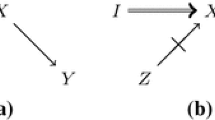Abstract
A distinction is made between functionaland intentionalcontrol in parent-child interaction. These concepts are drawn, respectively, from opérant and cognitive models of interaction process. Experimental evidence is presented that cognitive factors such as expectations or hypotheses indeed affect the relations between parents and their own children. This necessitates a further distinction between long-termand short-termcausal effects: Since changes in parents' expectations for their children may lag behind actual changes in children's behavior, short-term effects inferred from observations of ongoing interactions may not reflect the long-term dynamics of the relationship.
Similar content being viewed by others
Reference note
Blackwelder, D. E., Passman, R. H., & Grade, M.Effects of boys' improving, deteriorating, and stable learning performances on their mothers' administration of rewards and punishments. Paper presented at the meeting of the Society for Research in Child Development, San Francisco, March 1979.
References
Bell, R. Q. A rinterpretation of the direction of effects in studies of socialization.Psychological Review, 1968,75, 81–95.
Bell, R. Q., & Harper, L. V.Child effects on adults. Hillsdale, New Jersey: Erlbaum, 1977.
Chapman, M. Listening to reason: Chidren's attentiveness and parental discipline.Merrill-Palmer Quarterly, 1979,25, 251–263.
Cunningham, C. E., & Barkley, R. A. The interactions of hyperactive and normal children in free play and structured task.Child Development, 1979,50, 217–224.
Gewirtz, J. L., & Boyd, E. F. Experiments on mother-infant interaction underlying mutual attachment acqusition: The infant conditions the mother. In T. Alloway, P. Pliner, & L. Krames (Eds.),Advances in the study of communication and affect, Vol. 3. Attachment behavior. New York: Plenum, 1977.
Halverson, C. F., & Waldrop, M. F. Maternal behavior toward own and other preschool children: The problem of “ownness”.Child Development, 1970,41, 839–845.
Mulhern, R. K., & Passman, R. H. The child's behavioral pattern as a determinant of maternal punitiveness.Child Development, 1979,50, 815–820.
Skinner, B. F.Science and human behavior. New York: Macmillan, 1953.
Yarrow, M. R., Waxler, C. Z., & Scott, P. M. Child effects on adult behavior.Developmental Psychology, 1971,5, 300–311.
Author information
Authors and Affiliations
Rights and permissions
About this article
Cite this article
Chapman, M. Isolating causal effects through experimental changes in parent-child interaction. J Abnorm Child Psychol 9, 321–327 (1981). https://doi.org/10.1007/BF00916836
Revised:
Issue Date:
DOI: https://doi.org/10.1007/BF00916836




